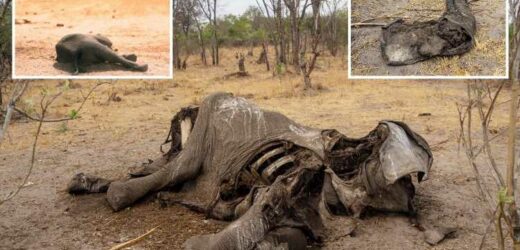ONCE flourishing animal conservation grounds have turned into two haunting elephant graveyards as Zimbabwe faces a devastating drought that has killed over 200 of the majestic animals.
A water shortage at Mana Pools and Hwange National Park due to a burst damn sees a mass relocation of hundreds of elephants and scores of lions and other animals.
Villiagers from Jutshume, near to Hwange National Park shared heartbreaking footage last month of a desperately thirsty baby elephant who had fallen itno a well looking for water.
The elephant was removed from the well and escaped back into the wild but residents fear the calf broke its leg.
Another adult elephant collapsed close to the village, but was luckily nursed back to health by hero villagers.
The animals used to drink from the Maitengwe dam, but it hasn't been repaired since the wall collapsed in 2005 – leaving miles of barren land.
Now Zimbabwe wildlife bosses plan to relocate 600 elephants, two prides of lion, a pack of wild dpgs, 50 buffalo, 40 giraffes and 2,000 impala.
What the parks and wildlife authority are dubbing "the biggest translocation in our history," will begin in November.
Experts have also warned that more elephants are set to die of thirst if the rainy season doesn't bring substantial water fall, with a recent drought leaving almost a third of Zimbabwe's population facing a food shortage until 2020, says the UN.
A spokesperson from the parks and wildlife authority said: "We are in desperate need of resources to provide water. We are desperately waiting for the rains."
MOST READ IN WORLD NEWS
SEE YOU IN COURT Prince Andrew demands trial by jury as he responds to sex abuse lawsuit
Luxury life of ‘world’s youngest billionaire’ who owned first mansion aged SIX
Chief Maddie suspect 'has circle of pals to provide alibi at key moment'
Ukraine's Neo Nazis prepare for Russia war with guerrillas & 'Mad Max' tanks
A spokesperson for wildlife conservation agency, Campfire said: "We are likely to lose even more elephants, especially if the rains are late.
"The world must know that Hwange relies on underground water, and it has never been easy for parks to maintain this overpopulated park.
Zimbabwe alone has around 85,000 elephants – with national parks and conservation areas only able to cope with 55,000 of that number.
Source: Read Full Article

















